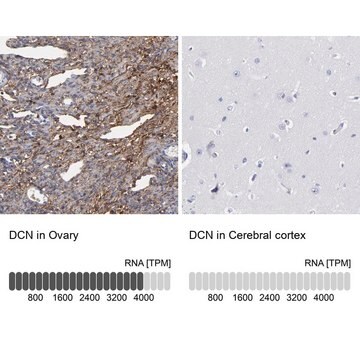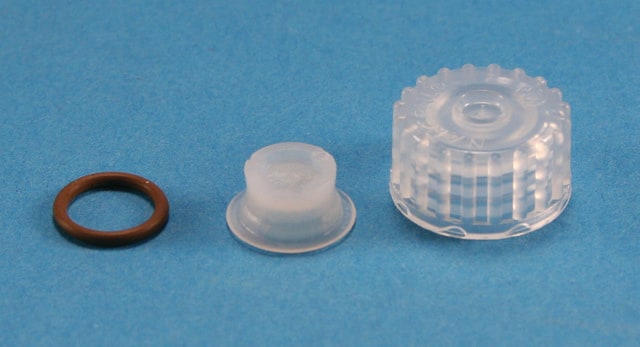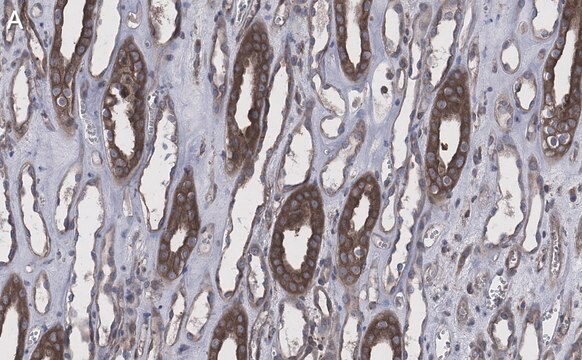おすすめの製品
由来生物
mouse
品質水準
結合体
unconjugated
抗体製品の状態
purified immunoglobulin
抗体製品タイプ
primary antibodies
クローン
polyclonal
形状
buffered aqueous solution
分子量
antigen ~45.8 kDa
化学種の反応性
human
テクニック
western blot: 1 μg/mL
NCBIアクセッション番号
UniProtアクセッション番号
輸送温度
dry ice
保管温度
−20°C
ターゲットの翻訳後修飾
unmodified
遺伝子情報
human ... CD209(30835)
詳細
Cluster of differentiation 209 (CD209), also known as dendritic cell-specific intercellular adhesion molecule-3-grabbing non-integrin (DC-SIGN), is part of the innate immune system. It is expressed by intestinal dendritic cells and alveolar macrophages. The gene encoding this C-type lectin contains seven exons and is localized on human chromosome 19p13.2.
This gene encodes a transmembrane receptor and is often referred to as DC-SIGN because of its expression on the surface of dendritic cells and macrophages. The encoded protein is involved in the innate immune system and recognizes numerous evolutionarily divergent pathogens ranging from parasites to viruses with a large impact on public health. The protein is organized into three distinct domains: an N-terminal transmembrane domain, a tandem-repeat neck domain and C-type lectin carbohydrate recognition domain. The extracellular region consisting of the C-type lectin and neck domains has a dual function as a pathogen recognition receptor and a cell adhesion receptor by binding carbohydrate ligands on the surface of microbes and endogenous cells. The neck region is important for homo-oligomerization which allows the receptor to bind multivalent ligands with high avidity. Variations in the number of 23 amino acid repeats in the neck domain of this protein are rare but have a significant impact on ligand binding ability. This gene is closely related in terms of both sequence and function to a neighboring gene (GeneID 10332; often referred to as L-SIGN). DC-SIGN and L-SIGN differ in their ligand-binding properties and distribution. Alternative splicing results in multiple variants.
免疫原
CD209 (NP_066978.1, 1 a.a. ~ 404 a.a) full-length human protein.
Sequence
MSDSKEPRLQQLGLLEEEQLRGLGFRQTRGYKSLAGCLGHGPLVLQLLSFTLLAGLLVQVSKVPSSISQEQSRQDAIYQNLTQLKAAVGELSEKSKLQEIYQELTQLKAAVGELPEKSKLQEIYQELTRLKAAVGELPEKSKLQEIYQELTWLKAAVGELPEKSKMQEIYQELTRLKAAVGELPEKSKQQEIYQELTRLKAAVGELPEKSKQQEIYQELTRLKAAVGELPEKSKQQEIYQELTQLKAAVERLCHPCPWEWTFFQGNCYFMSNSQRNWHDSITACKEVGAQLVVIKSAEEQNFLQLQSSRSNRFTWMGLSDLNQEGTWQWVDGSPLLPSFKQYWNRGEPNNVGEEDCAEFSGNGWNDDKCNLAKFWICKKSAASCSRDEEQFLSPAPATPNPPPA
Sequence
MSDSKEPRLQQLGLLEEEQLRGLGFRQTRGYKSLAGCLGHGPLVLQLLSFTLLAGLLVQVSKVPSSISQEQSRQDAIYQNLTQLKAAVGELSEKSKLQEIYQELTQLKAAVGELPEKSKLQEIYQELTRLKAAVGELPEKSKLQEIYQELTWLKAAVGELPEKSKMQEIYQELTRLKAAVGELPEKSKQQEIYQELTRLKAAVGELPEKSKQQEIYQELTRLKAAVGELPEKSKQQEIYQELTQLKAAVERLCHPCPWEWTFFQGNCYFMSNSQRNWHDSITACKEVGAQLVVIKSAEEQNFLQLQSSRSNRFTWMGLSDLNQEGTWQWVDGSPLLPSFKQYWNRGEPNNVGEEDCAEFSGNGWNDDKCNLAKFWICKKSAASCSRDEEQFLSPAPATPNPPPA
生物化学的/生理学的作用
Cluster of differentiation 209 (CD209) mediates viral infection and activates immune responses. It activates T-cells and aids in their growth. The protein recognizes various pathogens and triggers immunosuppressive reactions. It is involved in the innate immune system. It recognizes numerous evolutionarily divergent pathogens ranging from parasites to viruses that have severe health impacts on humans. CD209/ DC-SIGN mediates the entry of various viruses such as dengue virus, human immunodeficiency virus (HIV), Ebola virus and human cytomegalovirus into the human cells. CD209 acts as an alternative receptor for SARS-CoV-2, a causative agent for the novel coronavirus disease 2019 (COVID-19).
物理的形状
無色透明のPBS溶液、pH 7.4
適切な製品が見つかりませんか。
製品選択ツール.をお試しください
保管分類コード
10 - Combustible liquids
WGK
WGK 1
引火点(°F)
Not applicable
引火点(℃)
Not applicable
適用法令
試験研究用途を考慮した関連法令を主に挙げております。化学物質以外については、一部の情報のみ提供しています。 製品を安全かつ合法的に使用することは、使用者の義務です。最新情報により修正される場合があります。WEBの反映には時間を要することがあるため、適宜SDSをご参照ください。
Jan Code
SAB1407409-50UG:
試験成績書(COA)
製品のロット番号・バッチ番号を入力して、試験成績書(COA) を検索できます。ロット番号・バッチ番号は、製品ラベルに「Lot」または「Batch」に続いて記載されています。
The activation of B cells enhances DC-SIGN expression and promotes susceptibility of B cells to HPAI H5N1 infection.
Na-Ek P, et al.
Biochemical and Biophysical Research Communications, 490(4), 1301-1306 (2017)
The association between CD209 gene polymorphisms and pulmonary tuberculosis susceptibility: a meta-analysis.
Yi L, et al.
International Journal of Clinical and Experimental Pathology, 8(10), 12437-12437 (2015)
Human DC-SIGN binds specific human milk glycans.
Noll AJ, et al.
The Biochemical Journal (2016)
Edit I Buzás et al.
Autoimmunity, 39(8), 691-704 (2006-12-21)
The immune system is a complex functional network of diverse cells and soluble molecules orchestrating innate and adaptive immunity. Biological information, to run these intricate interactions, is not only stored in protein sequences but also in the structure of the
Boonrat Tassaneetrithep et al.
The Journal of experimental medicine, 197(7), 823-829 (2003-04-12)
Dengue virus is a single-stranded, enveloped RNA virus that productively infects human dendritic cells (DCs) primarily at the immature stage of their differentiation. We now find that all four serotypes of dengue use DC-SIGN (CD209), a C-type lectin, to infect
ライフサイエンス、有機合成、材料科学、クロマトグラフィー、分析など、あらゆる分野の研究に経験のあるメンバーがおります。.
製品に関するお問い合わせはこちら(テクニカルサービス)








